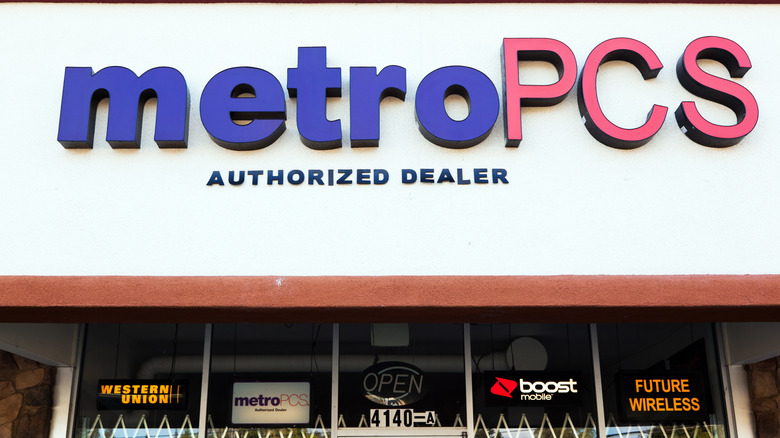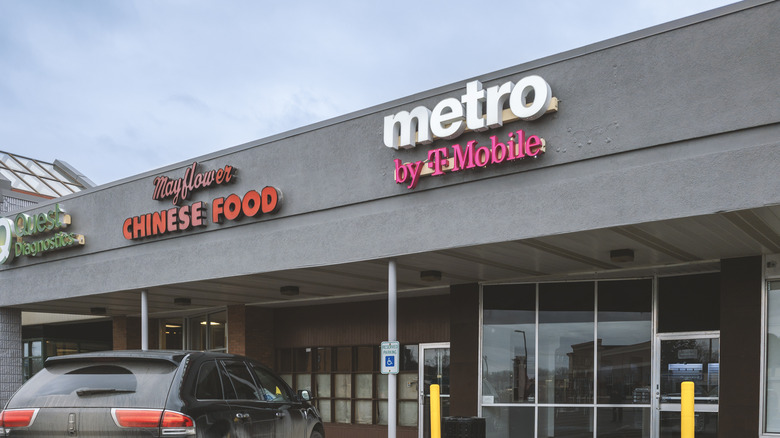What To Know Before Switching Your Cell Phone Service To MetroPCS
MetroPCS initially launched in 2002, operating only in major metropolitan hubs like New York City, Miami, and San Francisco. However, by 2005, the brand acquired over 1.5 million subscribers because of their affordable phone plans. The brand expanded its reach over time by entering markets in Dallas and Tampa. Its success attracted attention from the likes of T-Mobile, which moved to acquire MetroPCS in 2012 as a means to compete with other affordable brands like Cricket Wireless and Boost Mobile.
In 2018, T-Mobile changed the name from MetroPCS to Metro by T-Mobile. Metro accumulated 9 million users by the time of the merger, adding to T-Mobile's 32 million subscribers. Since then, Metro by T-Mobile's user base has increased to 19 million. It has become a reliable option for consumers who don't want to break the bank for a phone and a plan to go along with it.
However, just as consumers should know a thing or two before switching to T-Mobile, they should know a few things before switching over to Metro by T-Mobile. Metro offers some definite benefits, but there are also a few drawbacks that could be dealbreakers.
Pros
The first noticeable benefit consumers find by switching to Metro by T-Mobile is the prices. There are multiple plans to choose from, with the priciest one sitting at $60 per month for only one line. Granted, the prices increase with each additional line added to the plan, but its price tag remains considerably lower than premium brands. Below its top tier, there's a $50 and then a $40 plan. Each one offers a number of perks that add some value.
Each plan utilizes T-Mobile's broad 5G network and provides unlimited data and access to the T-Mobile Tuesdays perks. Naturally, the more expensive plan yields more perks than the others, including a 25 GB hotspot, unlimited texting, and a 100 GB Google One Membership. The $50 tier also provides access to a wireless hotspot, albeit at a smaller data cap.
Possibly the biggest draw to Metro by T-Mobile is the lack of contracts. Subscribers don't need to commit to Metro by T-Mobile, as they can modify or even cancel their plan without additional fees. Life is dynamic, and a subscriber's needs can change without notice, making Metro a good option for those in a transitional period of their life.
Cons
Like everything in life, switching to Metro also has its drawbacks. Despite users having access to T-Mobile's vast 5G network, there are complaints about lower data speeds in densely populated areas. Additionally, while Metro offers some of the more popular devices, such as the iPhone 15, its inventory isn't as expansive as premium carriers. The phone you have your heart set on might not be available through Metro by T-Mobile. Alternatively, if you want to keep your device when switching over from another provider, Metro might not support it.
Despite the service advertising some of its plans as unlimited, Metro throttles LTE service down to 2G speeds. Users who enjoy watching live streams or Netflix from their phone will be disappointed with Metro's services. Users receive a DVD-quality video experience over the cellular network, which is roughly 2.5 MBPS. However, to take advantage of HD-quality videos, users need to pay an additional charge.
Should you switch to Metro by T-Mobile?
There is no such thing as perfection in life. No mobile carrier is going to offer everything you want without some kind of downside, unfortunately. When looking for the right carrier, it's important to do some research. Compare providers to each other before making the leap. Prioritize your needs first before considering the features you want. Focusing on your wants is going to tack on incremental charges that add up.
However, Metro by T-Mobile should definitely be at the top of the list of affordable providers, if for no other reason than its lack of contracts. This makes it easier to transition over to a premium carrier if that's the goal. Naturally, there are other carriers that offer no contract deals, like Boost Mobile. That's when it's worth considering other perks.
Not all no contract carriers are backed by a premium provider like T-Mobile, which means the perks aren't as expansive. Something to consider when comparing Metro by T-Mobile to other affordable carriers.



